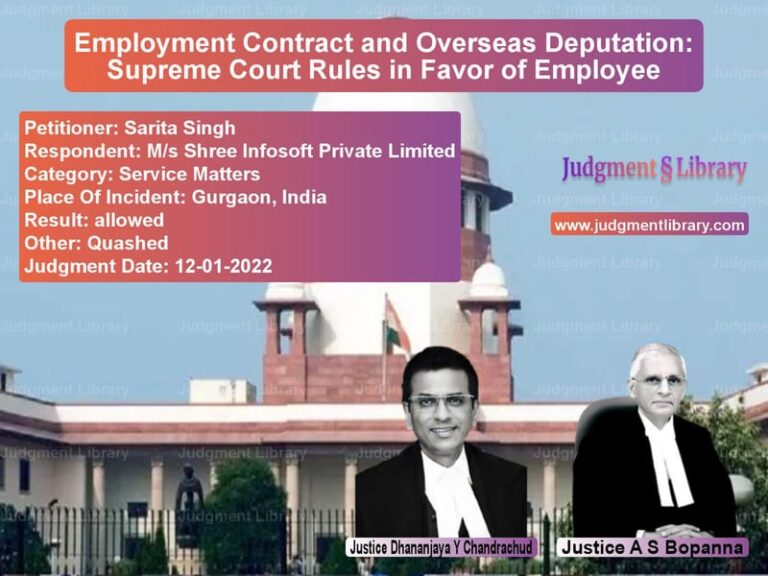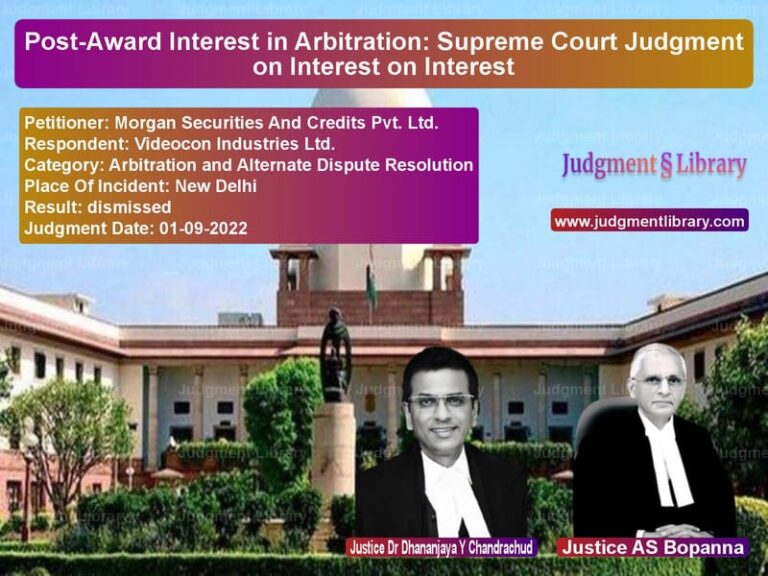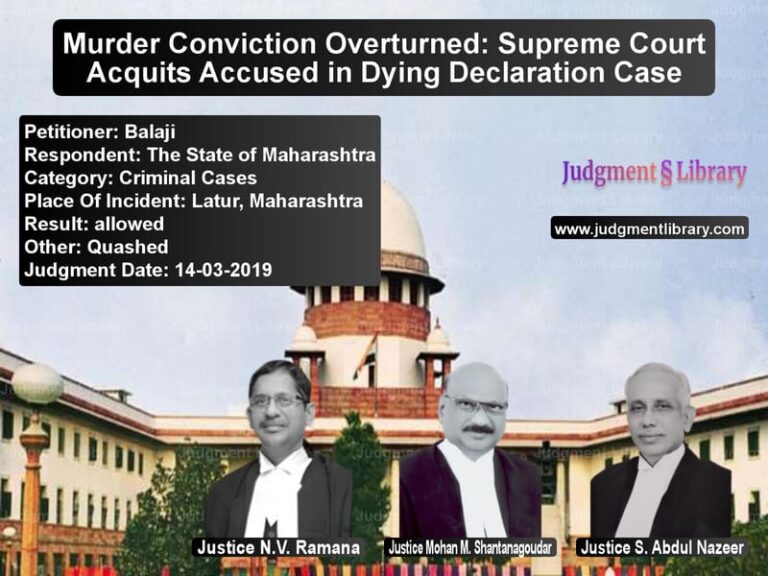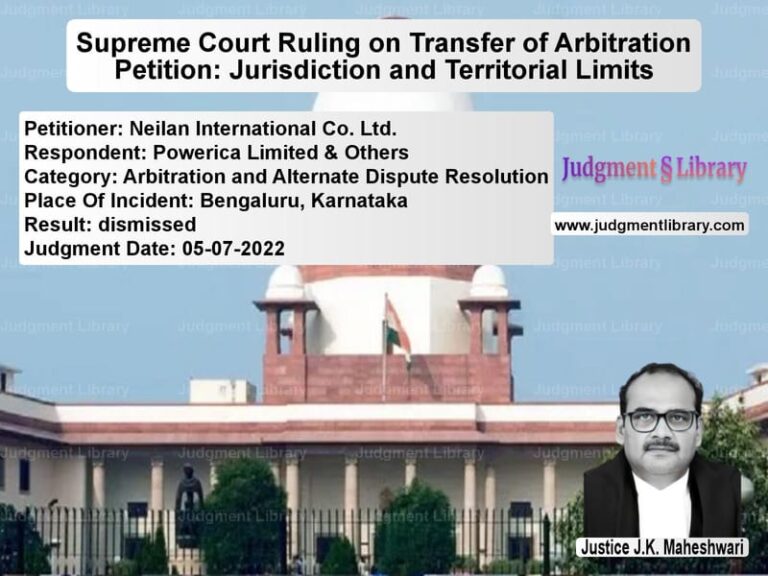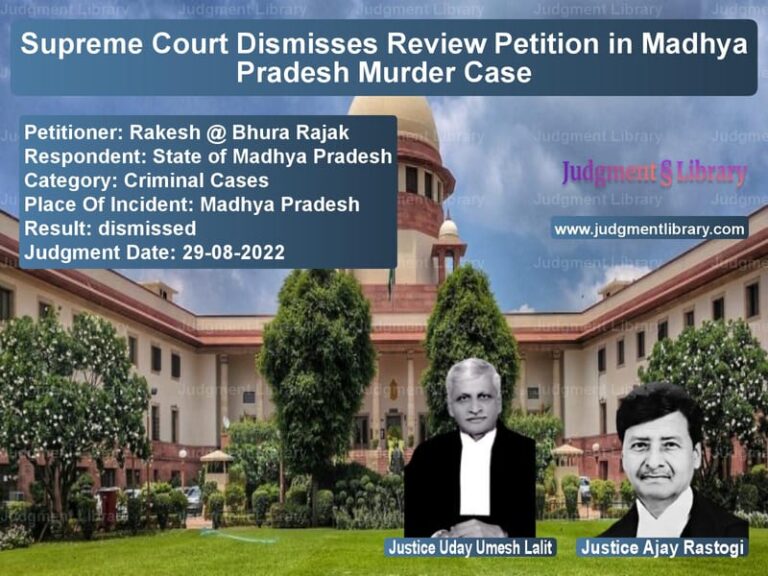Adani Gas vs. Union of India: Supreme Court Rules on Natural Gas Distribution Authorization
The Supreme Court of India in Adani Gas Limited vs. Union of India & Others dealt with a crucial dispute regarding the authorization for natural gas distribution in Udaipur and Jaipur. The case involved questions of government approvals, regulatory compliance, and the rights of companies to develop gas networks.
Background of the Case
Adani Gas Limited, the appellant, is a company registered under the Companies Act, 1956, engaged in setting up natural gas distribution networks. The dispute arose when the Rajasthan government revoked the No Objection Certificate (NOC) granted to Adani Gas for laying down gas pipelines in Udaipur and Jaipur. Additionally, the Petroleum and Natural Gas Regulatory Board (PNGRB) rejected Adani’s application for authorization under the Petroleum and Natural Gas Regulatory Board Regulations, 2008. The company challenged these decisions before the Rajasthan High Court, which ruled against it, leading to an appeal before the Supreme Court.
Petitioner’s Arguments (Adani Gas Limited)
- The government of Rajasthan had invited bids for laying gas distribution networks in various cities, including Udaipur and Jaipur, in 2005. Adani Gas submitted an Expression of Interest and was granted NOCs in 2006 after depositing a commitment fee of Rs. 2 crore.
- Adani Gas invested significantly in infrastructure development, laying approximately 75 kilometers of pipeline in these cities.
- Under Section 16 of the Petroleum and Natural Gas Regulatory Board Act, 2006, companies that had started work before the “appointed date” (October 1, 2007) were deemed to have authorization.
- The withdrawal of the NOCs by the Rajasthan government and rejection of authorization by PNGRB was arbitrary, ignoring the substantial work already completed.
- The company should have been granted deemed authorization under Section 16 of the Act, and the decision to reject its application under Regulation 18 of the 2008 Regulations was unjustified.
Respondent’s Arguments (Union of India & PNGRB)
- The Rajasthan government argued that Adani Gas had failed to meet certain conditions mentioned in the NOC and thus the withdrawal of approval was justified.
- PNGRB contended that the company had not made sufficient progress in physical and financial terms to qualify for authorization under Regulation 18 of the 2008 Regulations.
- Even after PNGRB’s press note in 2007 asking entities to halt all incremental activities pending regulatory approvals, Adani Gas continued laying pipelines in violation of directives.
- The company did not meet the requirement of completing at least 25% of the project’s capital expenditure before the appointed date, which was necessary for consideration under Regulation 18.
Supreme Court’s Judgment
The Supreme Court, in a decision delivered by Justices Arun Mishra and Vineet Saran, ruled in favor of Adani Gas Limited, overturning the High Court’s decision. The Court found multiple faults in the government’s and PNGRB’s handling of the case:
- Improper Revocation of NOC: The Rajasthan government withdrew the NOC without considering Adani Gas’s investments and progress in the project. The Court found this action arbitrary and legally untenable.
- Failure to Consider Deemed Authorization: The Court held that under Section 16 of the Act, entities that started operations before the appointed date were deemed to have authorization, and PNGRB should have considered this provision before rejecting Adani Gas’s application.
- Unfair Application of Regulations: The Court criticized PNGRB for applying Regulation 18 selectively, ignoring the company’s significant progress in infrastructure development.
- Lack of Due Process: The Court noted that Adani Gas was not given a proper opportunity to present its case before PNGRB before the rejection of its application.
Observations from the Judgment
The Court noted:
“The withdrawal of NOCs without considering the substantial investments and work completed by the appellant is arbitrary and in violation of the principles of natural justice.”
It further held:
“The rejection of the application under Regulation 18, without due consideration of the progress made by the appellant, reflects a lack of fairness in administrative decision-making.”
Impact of the Judgment
This ruling has significant implications for the regulation of natural gas distribution:
- It affirms the rights of companies that have made substantial investments based on government approvals.
- It ensures that regulatory bodies must adhere to principles of fairness and due process while making decisions.
- It clarifies that deemed authorization under Section 16 is a legitimate right for companies that began operations before the appointed date.
- It highlights the need for clear guidelines in handling NOCs and regulatory approvals in the energy sector.
Conclusion
The Supreme Court’s verdict in Adani Gas Limited vs. Union of India reinforces the need for fairness in government decision-making, particularly in cases involving large infrastructure investments. The ruling ensures that companies acting in good faith with substantial financial commitments are not unfairly penalized due to shifting regulatory frameworks.
Petitioner Name: Adani Gas Limited & Another.Respondent Name: Union of India & Others.Judgment By: Justice Arun Mishra, Justice Vineet Saran.Place Of Incident: Udaipur and Jaipur, Rajasthan.Judgment Date: 29-01-2019.
Don’t miss out on the full details! Download the complete judgment in PDF format below and gain valuable insights instantly!
Download Judgment: Adani Gas Limited & vs Union of India & Oth Supreme Court of India Judgment Dated 29-01-2019.pdf
Direct Downlaod Judgment: Direct downlaod this Judgment
See all petitions in Company Law
See all petitions in unfair trade practices
See all petitions in Corporate Compliance
See all petitions in Judgment by Arun Mishra
See all petitions in Judgment by Vineet Saran
See all petitions in allowed
See all petitions in Quashed
See all petitions in supreme court of India judgments January 2019
See all petitions in 2019 judgments
See all posts in Corporate and Commercial Cases Category
See all allowed petitions in Corporate and Commercial Cases Category
See all Dismissed petitions in Corporate and Commercial Cases Category
See all partially allowed petitions in Corporate and Commercial Cases Category


